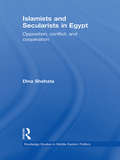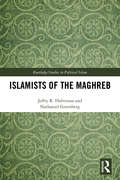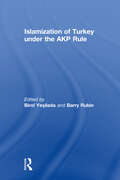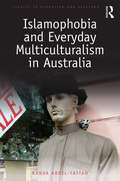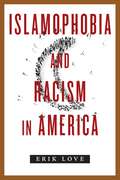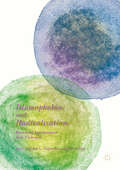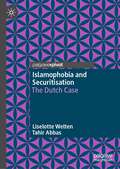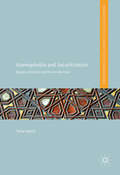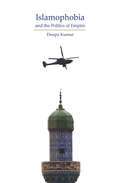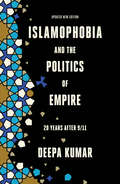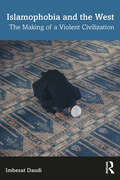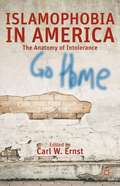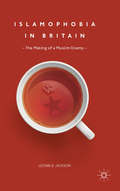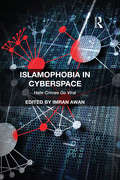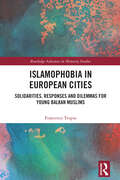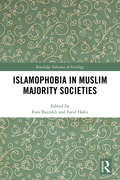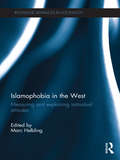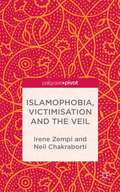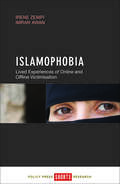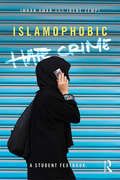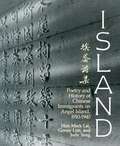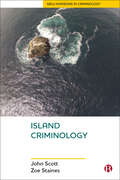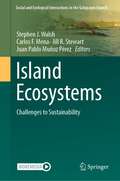- Table View
- List View
Islamists and Secularists in Egypt: Opposition, Conflict & Cooperation (Routledge Studies in Middle Eastern Politics)
by Dina ShehataIn a detailed analysis of the continued survival of authoritarian governments in the Arab world, this book uses Egypt as a case study to address the timely and complex issue of democratization in the Middle East. This book examines how relations between different actors in the Egyptian opposition have contributed to the endurance of authoritarianism in Egypt over the past three decades. The author argues that the longevity of the authoritarian government is not only a function of the strength and cohesion of the regime, but is also related to the weaknesses and divisions between opposition groupings, particularly between Islamists and non-Islamists. Looking at how such ideological differences and mobilizational asymmetries have impeded successful cooperation between different opposition groups, and how this allows the authoritarian regime to successfully ensure its continued hegemony, the author illustrates the extent to which opposition strategies profoundly affect successful transitions to democracy in the Arab world. Highlighting the main obstacles to democratic political reform in the region, the author provides important insights for the promotion of democracy in the region which will be a valuable addition to the literature on Middle Eastern politics and government.
Islamists and the Arab Revolutions: Bitter Experiences (Routledge Studies in Middle Eastern Democratization and Government)
by Khaled Hroub Abdullah BaaboodThis monograph offers the most comprehensive and regionally grounded analysis to date of how Islamist movements across the Middle East responded to – and were transformed by – the 2010–2011 Arab uprisings.Far from a monolithic force, Islamist actors across Egypt, Tunisia, Yemen, Morocco, Libya, Jordan, Syria, Sudan, and the Gulf reacted in divergent and contradictory ways to the revolutionary wave. This volume brings together scholars from within the region who not only document the evolving role of Islamist parties in their respective contexts but also critically examine how their ideologies, internal structures, and political strategies were challenged, revised, or, in some cases, further radicalized. Drawing on case studies of both participation and repression, electoral victories and authoritarian backlash, the chapters offer a panoramic view of Islamists navigating revolution, governance, exile, and counter-revolution. From the Muslim Brotherhood’s dramatic rise and fall in Egypt to Ennahda’s contested governance in Tunisia, and the fragmented Islamist scene in post-Qaddafi Libya, this book reveals how the Arab uprisings served as a turning point – exposing both the potential and the limits of political Islam.Essential reading for scholars and students of Middle East politics, Islamist movements, revolutionary studies, and democratization, this book provides crucial insights into the turbulent interplay between ideology, power, and social transformation in the contemporary Arab world.
Islamists of the Maghreb (Routledge Studies in Political Islam)
by Jeffry R. Halverson Nathaniel GreenbergIn 2011, the Maghreb occupied a prominent place in world headlines when Sidi Bouzid, Tunisia, became the birthplace of the so-called Arab Spring. Events in Tunisia sparked huge and sometimes violent uprisings. Longstanding dictatorships fell in their wake. The ensuing democratic reforms resulted in elections and the victory of several Islamist political parties in the Arab world. This book explores the origins, development and rise of these Islamist parties by focusing on the people behind them. In doing so, it provides readers with a concise history of Sunni Islam in North Africa, the violent struggles against European colonial occupation, and the subsequent quest for an affirmation of Muslim identities in its wake. Exploring Islamism as an identity movement rooted in the colonial experience, this book argues that votes for Islamist parties after the Arab Spring reflected a universal human need for an authentic sense of self. This view contrasts with the popular belief that support for Islamists in North Africa reflects a dangerous "fundamentalist" view of the world that seeks to simply impose archaic religious laws on modern societies. Rather, the electoral success of Islamists in the Maghreb, like Tunisia's Ennahdha party, is rooted in a reaffirmation of the Arab-Islamic identities of the Maghreb states, long delayed by dictatorships that mimicked Western models and ideologies (e.g., Socialism). Ultimately, however, it is argued that this affirmation is a temporary phenomenon that will give way in time to the fundamental need for good governance, accountability, and a stable growing economy in these countries. Written in an accessible format, and providing fresh analytical perspectives on Islamism in the Maghreb, this book will be a valuable tool for students and scholars of Political Islam and North African Politics.
Islamization of Turkey under the AKP Rule
by Barry Rubin Birol YeşiladaThis book examines the decade in office of the Justice and Development Party (AKP) and its efforts to transform the Turkish republic toward a more Islamist-oriented system. If it succeeds, Turkey’s dramatic shift will be the most important change in the Middle East power balance since the 1979 Iranian revolution and will have equally devastating effects on Western interests.For more than 80 years Turkey has been ruled by the secular democratic structures created by Kemal Ataturk. Now, however, the rise of the Justice and Development Party (AKP) and its series of electoral victories are creating a new system. Whilst portraying itself as a centre-right reform party, the AKP has been accused of having an Islamist agenda. After almost a decade in power, there is serious evidence that this claim is true. At home, the AKP has been changing basic Turkish attitudes and institutions, from buying up a large portion of the country’s media to revising its laws, and even taking the lead in the writing of a new constitution. Internationally, Turkey has moved away from the West and Israel toward Iran and radical Islamist groups. While its intentions—and ability to fulfil them—are still unclear, the AKP has been leading the most important transformation of Turkey since the formation of the republic after World War I. This book systematically examines the AKP’s ideology, support base, actions in office, and goals.This book was published as a special issue of the Turkish Studies.
Islamophobia and Everyday Multiculturalism in Australia (Studies in Migration and Diaspora)
by Randa Abdel-FattahThis book explores Islamophobia in Australia, shifting attention from its victims to its perpetrators by examining the visceral, atavistic nature of people’s feelings and responses to the Muslim ‘other’ in everyday life. Based on ethnographic fieldwork, Islamophobia and Everyday Multiculturalism sheds light on the problematisations of Muslims amongst Anglo and non-Anglo Australians, investigating the impact of whiteness on minorities’ various reactions to Muslims. Advancing a micro-interactional, ethnographically oriented perspective, the author demonstrates the ways in which Australia’s histories and logics of racial exclusion, thinking and expression produce processes in which whiteness socializes, habituates and ‘teaches’ ‘racialising’ behaviour, and shows how national and global events, moral panics, and political discourse infiltrate everyday encounters between Muslims and non-Muslims, producing distinct structures of feeling and discursive, affective and social practices of Islamophobia. As such, it will be of interest to social scientists with interests in race and ethnicity, migration and diaspora and Islamophobia.
Islamophobia and Racism in America
by Erik LoveChoice Top Book of 2017 Confronting and combating Islamophobia in America.Islamophobia has long been a part of the problem of racism in the United States, and it has only gotten worse in the wake of shocking terror attacks, the ongoing refugee crisis, and calls from public figures like Donald Trump for drastic action. As a result, the number of hate crimes committed against Middle Eastern Americans of all origins and religions have increased, and civil rights advocates struggle to confront this striking reality. In Islamophobia and Racism in America, Erik Love draws on in-depth interviews with Middle Eastern American advocates. He shows that, rather than using a well-worn civil rights strategy to advance reforms to protect a community affected by racism, many advocates are choosing to bolster universal civil liberties in the United States more generally, believing that these universal protections are reliable and strong enough to deal with social prejudice. In reality, Love reveals, civil rights protections are surprisingly weak, and do not offer enough avenues for justice, change, and community reassurance in the wake of hate crimes, discrimination, and social exclusion. A unique and timely study, Islamophobia and Racism in America wrestles with the disturbing implications of these findings for the persistence of racism—including Islamophobia—in the twenty-first century. As America becomes a “majority-minority” nation, this strategic shift in American civil rights advocacy signifies challenges in the decades ahead, making Love’s findings essential for anyone interested in the future of universal civil rights in the United States.
Islamophobia and Radicalization: Breeding Intolerance and Violence
by John L. Esposito Derya InerWhile the themes of radicalization and Islamophobia have been broadly addressed by academia, to date there has been little investigation of the crosspollination between the two. Is Islamophobia a significant catalyst or influence on radicalization and recruitment? How do radicalization and Islamophobia interact, operate, feed one another, and ultimately pull societies toward polar extremes in domestic and foreign policy? The wide-ranging and global contributions collected here explore these questions through perspectives grounded in sociology, political theory, psychology, and religion. The volume provides an urgently needed and timely examination of the root causes of both radicalization and Islamophobia; the cultural construction and consumption of radical and Islamophobic discourses; the local and global contexts that fertilize these extreme stances; and, finally, the everyday Muslim in the shadow of these opposing but equally vociferous forces.
Islamophobia and Securitisation: The Dutch Case
by Tahir Abbas Liselotte WeltenThis book examines how Muslim communities in the Netherlands perceive and experience extremism, counter-radicalisation policies, and Islamophobia. It is based on the findings of two original qualitative research investigations conducted in the Netherlands, in which thirty scholars, imams, mosque board members, and representatives of Islamic organisations were interviewed. The book delves into topics such as the politicisation of the Dutch media, misunderstandings about ‘radicalisation’ and how they contribute to securitisation, and how Dutch Muslims have been confronted with the dilemma of dealing with radicalisation on their own, while also facing further vilification, securitisation, and Islamophobia, all of which continue to be issues. Additionally, the study examines the significance of ‘radical Salafi’ ideology and recruitment techniques as seen by Dutch Muslim communities.
Islamophobia and Securitization
by Tania SaeedThis book explores everyday realities of young Muslim women in Britain, who are portrayed as antithetical to the British way of life in media and political discourse. The book captures how geo-political events, and national tragedies continue to implicate individuals and communities at the domestic and local level, communities that have no connection to such tragedies and events, other than being associated with a religio-ethnic identity. The author shows how Muslim women are caught within the spectrum of the vulnerable-fanatic, always perceived to be 'at risk' of being 'radicalized'. Focusing on educated Muslim females, the book explores experiences of Islamophobia and securitization inside and outside educational institutions, and highlights individual and group acts of resistance through dialogue, with Muslim women challenging the metanarrative of insecurity and suspicion that plagues their everyday existence in Britain. Islamophobia and Securitization will be of interest to scholars and students researching Muslims in the West, in particular sociologists, anthropologists, and political scientists. It will also appeal to analysts and academics researching security and terrorism, race and racialization, as well as gender, immigration, and diaspora.
Islamophobia and Securitization: Religion, Ethnicity and the Female Voice (Palgrave Politics of Identity and Citizenship Series)
by Tania SaeedThis book explores everyday realities of young Muslim women in Britain, who are portrayed as antithetical to the British way of life in media and political discourse. The book captures how geo-political events, and national tragedies continue to implicate individuals and communities at the domestic and local level, communities that have no connection to such tragedies and events, other than being associated with a religio-ethnic identity. The author shows how Muslim women are caught within the spectrum of the vulnerable-fanatic, always perceived to be ‘at risk’ of being 'radicalized'. Focusing on educated Muslim females, the book explores experiences of Islamophobia and securitization inside and outside educational institutions, and highlights individual and group acts of resistance through dialogue, with Muslim women challenging the metanarrative of insecurity and suspicion that plagues their everyday existence in Britain. Islamophobia and Securitization will be of interest to scholars and students researching Muslims in the West, in particular sociologists, anthropologists, and political scientists. It will also appeal to analysts and academics researching security and terrorism, race and racialization, as well as gender, immigration, and diaspora.
Islamophobia and the Politics of Empire
by Deepa KumarIn response to the events of 9/11, the Bush administration launched a "war on terror" ushering in an era of anti-Muslim racism, or Islamophobia. However, 9/11 alone did not create Islamophobia. This book examines the current backlash within the context of Islamophobia's origins, in the historic relationship between East and West. Deepa Kumar is an associate professor of media studies and Middle East studies at Rutgers University and the author of Outside the Box: Corporate Media, Globalization and the UPS Strike. Kumar has contributed to numerous outlets including the BBC, USA Today, and the Philadelphia Inquirer.
Islamophobia and the Politics of Empire: 20 years after 9/11
by Deepa KumarA critically acclaimed analysis of anti-Muslim racism from the sixteenth to the twenty-first centuries, in a fully revised and expanded second editionIn this incisive account, leading scholar of Islamophobia Deepa Kumar traces the history of anti-Muslim racism from the early modern era to the &“War on Terror.&” Importantly, Kumar contends that Islamophobia is best understood as racism rather than as religious intolerance. An innovative analysis of anti-Muslim racism and empire, Islamophobia argues that empire creates the conditions for anti-Muslim racism, which in turn sustains empire. This book, now updated to include the end of the Trump&’s presidency, offers a clear and succinct explanation of how Islamophobia functions in the United States both as a set of coercive policies and as a body of ideas that take various forms: liberal, conservative, and rightwing. The matrix of anti-Muslim racism charts how various institutions—the media, think tanks, the foreign policy establishment, the university, the national security apparatus, and the legal sphere—produce and circulate this particular form of bigotry. Anti-Muslim racism not only has horrific consequences for people in Muslim-majority countries who become the targets of an endless War on Terror, but for Muslims and those who &“look Muslim&” in the West as well.With a new foreword by Nadine Naber.
Islamophobia and the West: The Making of a Violent Civilization
by Imbesat DaudiThis book provides an engaging and insightful look into the definitions, discourse and experiences of Islamophobia and its steady rise since 9/11. It analyses concepts and binaries that are drawn around discussions on civilization, religious dogma, violence, and race. Is there a link between Islam and violence? Why does the West feel threatened by it? The author critically examines these questions and the birth of hate politics which packages hate in a marketable format and often demonizes victims. It also looks at the role of the media in the West in perpetuating stereotypes and its consequences and the nature of war reportage in Islamic countries while deconstructing the narrative of the clash of civilizations. Topical and lucid, this book is a must-read for students and scholars of sociology, international relations, peace and conflict studies, political science, Islamic studies and for other readers interested in these topics.
Islamophobia in America
by Carl W. ErnstIslamophobia is the name given to the virulent anti-Islamic prejudice that has been hyped by the news media and seized upon by cynical politicians. Five essays by six specialists on Islam in America provide important insights into Islamophobia as a conflict over American identity during a time of crisis. The authors clarify the way that differences of religion, race, and gender have been used to portray Muslims as threatening "out-groups," just as other minorities (Catholics, Jews, blacks) have been attacked in the past. The result is a valuable and thought-provoking analysis of the tactics for denying full citizenship to a minority religious group.
Islamophobia in Britain
by Leonie B. JacksonThis book is concerned with the ideology of Islamophobia as a cultural racism, and argues that in order to understand its prevalence we must focus not only on what Islamophobia is, but also why diversely situated individuals and groups choose to employ its narratives and tropes. Since 2001, Muslims in Britain have been constructed as the nation's significant 'other' - an internal and external enemy that threatened both social cohesion and national security. Through a consideration of a number of pertinent contemporary issues, including no-mosque campaigns, the rise of anti-Islamist social movements and the problematisation of Muslim culture, this book offers a new understanding of Islamophobia as a form of Eurocentric spatial dominance, in which those identified as Western receive a better social, economic and political 'racial contract', and seek to defend these privileges against real and imagined Muslim demands.
Islamophobia in Cyberspace: Hate Crimes Go Viral
by Imran AwanCyber hate can take many different forms from online material which can lead to actual offline abuse and violence, cyber violence; cyber stalking, and online harassment with the use of visual images, videos, chat rooms, text and social media which are intended to cause harm. This book examines the case for current guidelines dealing with online anti-Muslim abuse and concludes that we require a new understanding of this online behaviour and the impact it can have on vulnerable communities. It is unique as it focuses on new technology in the form of social media and the Internet and explores the challenges the police and other agencies face when confronting anti-Muslim abuse in cyberspace. It also provides a critique of how people are targeted by online offenders and helps us understand online anti-Muslim behaviour in a much more detailed and comprehensive way by bringing together a range of experts who will examine this phenomenon and critically discuss why they think it has become so much more prevalent than it was before.
Islamophobia in European Cities: Solidarities, Responses and Dilemmas for Young Balkan Muslims (Routledge Advances in Minority Studies)
by Francesco TrupiaThe demise of socialism in Southeast Europe coincided with the breakout of wars and genocidal violence against local Muslim populations. After being displaced and forced to migrate to different European countries, those former socialist citizens quickly developed institutions of sociability and unobtrusively enacted postulates of solidarity. This book brings a spotlight on the “generations after” born to Balkan Muslim families whose repatriation could not take place due to the continuous political instability and insecurity in their homelands. It investigates the new modes of these “second generations” to respond to the current crisis of liberal democracy and rampant Islamophobia in their places of residence. By relating spatial issues to broader religious and political questions, this study shines a light on the civic engagement, religious practices and political sensitivities of young Muslims with Balkan roots in Belgium, Germany, Italy and Poland. The book will be of interest to academics, researchers and policy-makers working in the areas of Islamic Studies, Migration Studies, Anthropology of Religion and Memory Studies.
Islamophobia in Muslim Majority Societies (Routledge Advances in Sociology)
by Enes Bayraklı Farid HafezIn the last decade, Islamophobia in Western societies, where Muslims constitute the minority, has been studied extensively. However, Islamophobia is not restricted to the geography of the West, but rather constitutes a global phenomenon. It affects Muslim societies just as much, due to various historical, economic, political, cultural and social reasons. Islamophobia in Muslim Majority Societies constitutes a first attempt to open a debate about the understudied phenomenon of Islamophobia in Muslim majority societies. An interdisciplinary study, it focuses on socio-political and historical aspects of Islamophobia in Muslim majority societies. This volume will appeal to students, scholars and general readers who are interested in Racism Studies, Islamophobia Studies, the Middle East and North Africa (MENA) region, Islam and Politics.
Islamophobia in the West: Measuring and Explaining Individual Attitudes (Routledge Advances in Sociology)
by Marc HelblingSince the late 1980s, growing migration from countries with a Muslim cultural background, and increasing Islamic fundamentalism related to terrorist attacks in Western Europe and the US, have created a new research field investigating the way states and ordinary citizens react to these new phenomena. However, whilst we already know much about how Islam finds its place in Western Europe and North America, and how states react to Muslim migration, we know surprisingly little about the attitudes of ordinary citizens towards Muslim migrants and Islam. Islamophobia has only recently started to be addressed by social scientists. With contributions by leading researchers from many countries in Western Europe and North America, this book brings a new, transatlantic perspective to this growing field and establishes an important basis for further research in the area. It addresses several essential questions about Islamophobia, including: what exactly is Islamophobia and how can we measure it? how is it related to similar social phenomena, such as xenophobia? how widespread are Islamophobic attitudes, and how can they be explained? how are Muslims different from other outgroups and what role does terrorism and 9/11 play? Islamophobia in the West will be of interest to students and scholars of sociology, religious studies, social psychology, political science, ethnology, and legal science.
Islamophobia, Victimisation and the Veil
by Neil Chakraborti Irene ZempiThis book examines the experiences of veiled Muslim women as victims of Islamophobia, and the impact of this victimisation upon women, their families and wider Muslim communities. It proposes a more effective approach to engaging with these victims; one which recognises their multiple vulnerabilities and their distinct cultural and religious needs.
Islamophobia: Lived Experiences of Online and Offline Victimisation
by Imran Awan Irene ZempiIslamophobia examines the online and offline experiences of hate crime against Muslims, and the impact upon victims, their families and wider communities. Based on the first national hate crime study to examine the nature, extent and determinants of Muslim victims of hate crime in the virtual and physical worlds, it highlights the multidimensional relationship between online and offline anti-Muslim attacks, especially in a global context. It includes the voices of victims themselves which leads to a more nuanced understanding of anti-Muslim hate crime and prevention of future anti-Muslim hate crime as well as strategies for future prevention.
Islamophobic Hate Crime: A Student Textbook
by Imran Awan Irene ZempiIn recent years, there has been a sharp increase in anti-Muslim attacks. What is driving the proliferation of these hate crimes? Why are Muslims being demonised? Building on current research and drawing upon real-life examples and case studies, this book provides an accessible introduction to Islamophobia and Islamophobic hate crimes along with the various responses to this form of victimisation. Chapters cover a range of topics including: • Definitions of hate crime and Islamophobia • Islamophobic hate crime online • Gender and Islamophobia • Media representations of Islamophobia • Institutional Islamophobia As one of the first student resources dedicated to the subject of Islamophobia, this book will be instructive and important reading for those engaged in a range of topics in criminology, including hate crime, victimology and victimisation, crime and media, and gender and crime.
Island
by Him M. Lai Genny Lim Judy YungAngel Island, in San Francisco Bay, was the entry, internment center, and often closest approach to the US for Chinese immigrants in the early 20th century. Here are the thoughts they carved and ink-brushed on their barrack's walls, discovered after the center closed in 1940. Facing pages of Chinese and English.
Island Criminology (New Horizons in Criminology)
by John Scott Zoe StainesTen percent of the world’s population lives on islands, but until now the place and space characteristics of islands in criminological theory have not been deeply considered. This book moves beyond the question of whether islands have more, or less, crime than other places, and instead addresses issues of how, and by whom, crime is defined in island settings, which crimes are policed and visible, and who is subject to regulation. These questions are informed by ‘the politics of place and belonging’ and the distinctive social networks and normative structures of island communities.
Island Ecosystems: Challenges to Sustainability (Social and Ecological Interactions in the Galapagos Islands)
by Stephen J. Walsh Carlos F. Mena Jill R. Stewart Juan Pablo Muñoz PérezSustainable development is a process to improve the quality of life of people, while maintaining the ability of social–ecological systems to continue to provide valuable ecological services that social systems require. In the Galapagos Islands, the maintenance of amenity resources to support tourism and the quality of life of residents is explicitly linked to ecosystem goods and services, particularly, the accessibility to high-quality natural environments and the terrestrial and marine visitation sites that showcase iconic species.On June 26-30, 2022, the Galapagos Science Center celebrated its 10-Year Anniversary. As the crowning event of the anniversary celebration, the World Summit on Island Sustainability was held on San Cristobal Island, Galapagos Archipelago of Ecuador. The intent of the World Summit was to bring together leading experts on island ecosystems and, particularly, on island sustainability from across the globe to represent a diversity of perspectives, approaches, and stakeholder groups. The World Summit was an exclusive event that featured an “expert convening” of scholars and practitioners to address the social, terrestrial, and marine sub-systems of the Galapagos Islands and other similarly challenged island ecosystems from around the globe. The World Summit attracted 150 scientists to the Galapagos Islands to discuss projects conducted, for instance, in the Galapagos Islands, Hawaii, Guam, French Polynesia, Chile, Australia, and the Caribbean Islands. Island vulnerability, resilience, and sustainability were examined by scholars, for instance, from the University of North Carolina at Chapel Hill, Universidad San Francisco de Quito, Catholic University of Chile, University of Guam, James Cook University, University of the Sunshine Coast, North Carolina State University, North Carolina Museum of Natural Sciences, California Academy of Sciences, University of San Francisco, and the University of South Alabama as well as affiliated scientists from Exeter University, University of Edinburgh, University of Southampton, and the Galapagos National Park. The World Summit also included scholars from Re:wild, World Wildlife Fund, EarthEcho, and the East-West Center, Hawaii.
